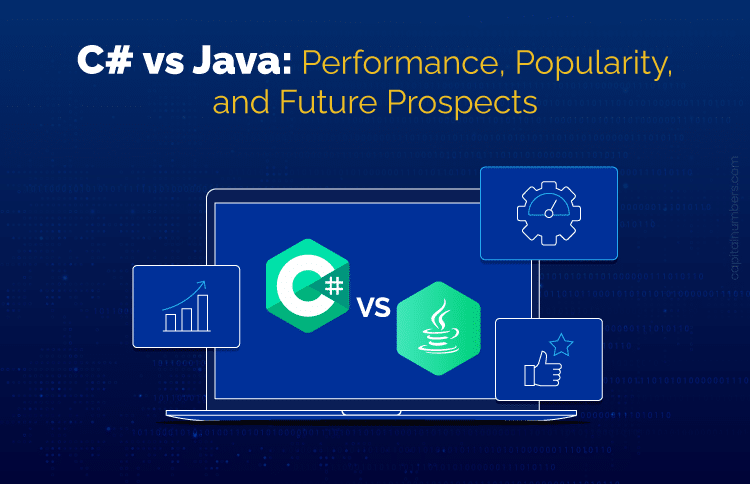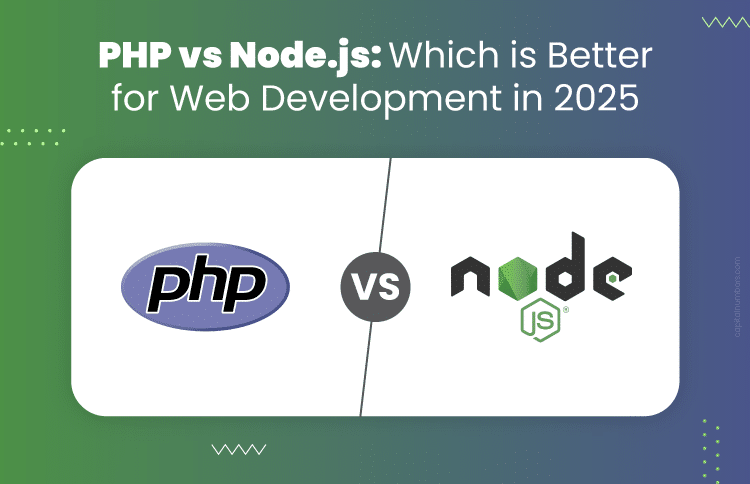C# vs Java: Performance, Popularity, and Future Prospects
Table of Contents
C# and Java are two of the most popular programming languages used by developers today. C# was developed by Microsoft and is widely used for building Windows applications, web services, and games. Java, created by Sun Microsystems (now owned by Oracle), is known for its portability and is used in enterprise applications, Android development, and large-scale web applications.
Comparing these two languages is important because it helps businesses choose the right technology based on project requirements, performance needs, and future trends. This blog aims to provide a detailed comparison of C# and Java, focusing on three key aspects: performance, popularity, and future prospects. By understanding these factors, businesses can make more informed decisions about which language to use for their next project.
Language Overview
C# Overview
History and Evolution:
- Development: C# (pronounced “C-sharp”) was developed by Microsoft and first introduced in 2000 as part of the .NET initiative.
- Evolution: Over the years, C# has evolved significantly, with regular updates that have added new features and improved its capabilities. C# 12 includes features like enhanced pattern matching, default interface methods, primary constructors, and readonly record structs.
Key Features and Characteristics:
- Strong Typing: C# is a statically-typed language, which means variable types are known at compile time, helping to catch errors early.
- Object-Oriented: C# supports all the principles of object-oriented programming (OOP), including inheritance, encapsulation, and polymorphism.
- Component-Oriented: It allows for the creation of reusable software components.
- LINQ (Language Integrated Query): LINQ provides powerful query capabilities directly in the C# language for collections of data.
- Asynchronous Programming: C# has built-in support for asynchronous programming with the async and await keywords, which makes it easier to write efficient, non-blocking code.
Primary Use Cases:
- Windows Applications: C# is commonly used for developing Windows desktop applications with frameworks like Windows Forms and WPF.
- Web Development: ASP.NET, a powerful framework for building web applications, is based on C#.
- Game Development: C# is the primary language used with the Unity game engine, making it a popular choice for game developers.
- Mobile Development: Xamarin, a framework for cross-platform mobile app development, uses C#.
Java Overview
History and Evolution:
- Development: Java was created by Sun Microsystems (now owned by Oracle) and released in 1995. It was designed with the philosophy of “write once, run anywhere,” which means Java applications can run on any device with a Java Virtual Machine (JVM).
- Evolution: Java has seen numerous updates over the years, with the latest versions introducing features like the module system, improved garbage collection, and enhanced API libraries.
Key Features and Characteristics:
- Portability: One of Java’s biggest strengths is its platform independence. Java code is compiled into bytecode, which can run on any device with a JVM.
- Object-Oriented: Java is fully object-oriented, supporting OOP principles like inheritance, encapsulation, and polymorphism.
- Robust and Secure: Java provides strong memory management, exception handling, and built-in security features to create reliable applications.
- Multithreading: Java has built-in support for multithreading, allowing developers to build highly concurrent applications.
- Rich Standard Library: Java comes with a comprehensive standard library that provides many useful APIs for various tasks, from data structures to networking.
Primary Use Cases:
- Enterprise Applications: Java is widely used in large-scale enterprise environments, particularly for building back-end systems and server-side applications.
- Web Applications: Java-based frameworks like Spring and Hibernate are popular for building robust web applications.
- Android Development: Java was the primary language for Android app development before Kotlin, and it is still widely used.
- Big Data: Java is used in big data technologies like Hadoop and Apache Spark, making it a critical language in data engineering and analytics.
Performance Comparison
Execution and Runtime
Comparison of Execution Models (JIT vs. AOT Compilation):
- Just-In-Time (JIT) Compilation: Both C# and Java primarily use JIT compilation, where the code is compiled to machine code at runtime. This approach allows the runtime to optimize the code based on the current execution context, improving performance.
- Ahead-Of-Time (AOT) Compilation: While JIT is common, both languages can also use AOT compilation. AOT compiles code before runtime, which can improve startup times and reduce memory usage. C#’s .NET Core supports AOT, and Java has the GraalVM for AOT compilation.
Runtime Environments (CLR for C# and JVM for Java):
- Common Language Runtime (CLR): The CLR is the runtime environment for C#. It handles execution of code, memory management, and various system services. It includes a JIT compiler to convert C# code into machine code at runtime.
- Java Virtual Machine (JVM): The JVM is the runtime environment for Java. It executes Java bytecode and provides memory management and system services. The JVM also uses a JIT compiler to optimize performance.
Performance Benchmarks and Case Studies:
- Benchmarks: Performance benchmarks show that both C# and Java are highly performant, but the exact performance can vary based on the specific use case and environment. Generally, C# may have an edge on Windows platforms, while Java performs consistently well across various operating systems.
- Case Studies: Real-world case studies often highlight that both languages can handle high-performance applications effectively, with differences arising more from specific implementation details than from the languages themselves.
Memory Management
Garbage Collection Mechanisms and Differences:
- C# (CLR): The CLR uses a generational garbage collector, which organizes objects by their lifetimes to optimize performance. Short-lived objects are collected frequently, while long-lived objects are collected less often.
- Java (JVM): The JVM also uses generational garbage collection, with several garbage collectors to choose from (e.g., G1, Shenandoah). Java Developers can select the garbage collector that best fits their application needs.
Memory Allocation and Optimization Techniques:
- C#: Provides tools like the Dispose pattern and using statements to help manage resources. Memory can be optimized using value types (structs) for small, short-lived data.
- Java: Uses a combination of automatic garbage collection and explicit memory management techniques. Tools like the try-with-resources statement help manage resources effectively.
Concurrency and Parallelism
Support for Multi-threading and Asynchronous Programming:
- C#: Supports multi-threading with the Thread class and the Task Parallel Library (TPL). Asynchronous programming is facilitated by the async and await keywords, making it easier to write non-blocking code.
- Java: Provides multi-threading through the Thread class and the Executor framework. The CompletableFuture class and other concurrency utilities support asynchronous programming.
Performance in Multi-core and Distributed Environments:
- C#: The TPL and Parallel class enable efficient use of multi-core processors. C# also supports distributed computing scenarios through frameworks like Akka.NET and Orleans.
- Java: The ForkJoinPool and Stream API allow Java to efficiently utilize multi-core processors. Java’s ecosystem includes robust tools for distributed computing, such as Apache Kafka and Hadoop.
Platform-Specific Performance
Performance on Windows, Linux, and Other Platforms:
- C#: Designed with strong performance on Windows in mind. With .NET Core, C# has improved cross-platform support and performance on Linux and macOS.
- Java: Known for its platform independence, Java performs consistently well on various operating systems, including Windows, Linux, and macOS.
Cross-Platform Capabilities and Associated Overheads:
- C#: .NET Core and .NET 5+ enhance C#’s cross-platform capabilities, reducing overhead and improving performance on non-Windows platforms.
- Java: Java’s JVM is optimized for cross-platform performance, though there can be some overhead due to the abstraction layer. However, Java’s long history and mature ecosystem mitigate most performance concerns.
Popularity and Community Support
Market Share and Adoption
Statistics on Language Popularity:
- C#: According to various programming language rankings (like TIOBE and RedMonk), C# consistently ranks among the top 10 most popular languages. It is widely used in many different areas of software development.
- Java: Java is often ranked in the top 3 of the same rankings, reflecting its long-standing popularity and extensive use across the software industry.
Adoption in Different Industries:
- Enterprise:
- C#: Heavily used in enterprise environments, especially within organizations that rely on Microsoft technologies. Commonly used for internal business applications, enterprise resource planning (ERP) systems, and customer relationship management (CRM) software.
- Java: A staple in enterprise environments due to its robustness and scalability. Frequently used in banking, finance, and large-scale enterprise applications.
- Web Development:
- C#: ASP.NET is a powerful framework for building dynamic web applications, making C# a popular choice for web development.
- Java: Java frameworks like Spring and JavaServer Faces (JSF) are widely used for developing web applications.
- Mobile Apps:
- C#: Used in mobile app development through Xamarin, which allows for cross-platform development on iOS and Android.
- Java: Historically the primary language for Android development, though now often used alongside Kotlin.
Community and Ecosystem
Size and Activity of Developer Communities:
- C#: The C# developer community is large and very active. Platforms like Stack Overflow, GitHub, and various forums have robust discussions and support.
- Java: Java has one of the largest and most active developer communities in the world. The community is very engaged on platforms like Stack Overflow, GitHub, and numerous Java-specific forums.
Availability of Libraries, Frameworks, and Tools:
- C#: Offers a wide range of libraries and frameworks, particularly through the .NET ecosystem. Tools like Visual Studio provide a comprehensive development environment.
- Java: Java has a rich ecosystem with a vast number of libraries and frameworks. Development tools like IntelliJ IDEA, Eclipse, and NetBeans are highly popular.
Community Contributions and Open-Source Projects:
- C#: Many open-source projects and contributions are available, especially on platforms like GitHub. The .NET Foundation supports many open-source C# projects.
- Java: The Java community is known for its strong contributions to open-source projects. Major projects like Apache Hadoop, Spring, and many others are driven by community contributions.
Future Prospects
Language Evolution and Updates
Recent Updates and Features in C#:
- C# 12 and .NET 8: The latest versions bring several new features. C# 12 introduces default implementations in interfaces, primary constructors, and enhancements to pattern matching, making the language more flexible and powerful.
- Continuous Improvement: Microsoft is committed to regularly updating C# and .NET to include modern programming features, improving performance, and enhancing developer productivity.
Recent Updates and Features in Java:
- Java 22: The latest version of Java includes new features such as improved pattern matching, enhanced virtual threads (Project Loom), and updates to the foreign function and memory API. These features aim to simplify concurrent programming and improve interaction with non-Java code.
- Innovative Additions: Java 22 continues to evolve with a focus on developer efficiency and performance, maintaining its relevance in a rapidly changing technological landscape.
Roadmaps and Upcoming Features:
- C# and .NET: Future updates will focus on enhancing cloud-native capabilities, improving performance, and introducing more syntactic sugar to make coding easier and more intuitive.
- Java: Upcoming features are expected to further enhance performance, security, and integration with modern technologies like machine learning and big data frameworks.
Technological Trends
Impact of Emerging Technologies (Cloud Computing, AI/ML, IoT):
- C# and .NET: Widely used in developing cloud-based applications, especially with Azure. New tools and frameworks make it easier to integrate AI/ML and IoT solutions.
- Java: Strong presence in cloud computing with support for major cloud platforms like AWS, Google Cloud, and Azure. Java’s robust ecosystem supports AI/ML libraries (e.g., Deeplearning4j) and IoT applications (e.g., Eclipse IoT).
Adoption in Modern Software Architectures (Microservices, Serverless, etc.):
- C#: .NET 8 offers enhanced support for microservices and serverless architectures with tools like Dapr and Azure Functions.
- Java: Continues to be a strong choice for microservices with frameworks like Spring Boot. Java’s support for serverless computing is growing with AWS Lambda and Google Cloud Functions.
Industry Adoption
Predictions for Future Industry Adoption:
- C#: Expected to grow in enterprise environments, especially where Microsoft technologies dominate. Its strong integration with Azure makes it a preferred choice for cloud-based solutions.
- Java: Likely to maintain its stronghold in large-scale enterprise applications, finance, and Android development. The language’s versatility ensures its continued relevance across various domains.
Case Studies of Companies Leveraging C# and Java:
- C#: Companies like Stack Overflow and Accenture use C# for building scalable web applications and enterprise solutions.
- Java: Major enterprises like LinkedIn and Netflix use Java to build robust, high-performance backend systems.
Community and Ecosystem Growth
Trends in Community Growth and Contributions:
- C#: The community continues to grow, with significant contributions on GitHub and active participation in forums like Stack Overflow and Reddit. The .NET Foundation supports many open-source projects, fostering innovation and collaboration.
- Java: Java’s community remains one of the largest and most active. Contributions to open-source projects like Spring and Apache Spark continue to drive the language’s evolution. Platforms like GitHub and Stack Overflow see extensive Java-related activity.
Evolution of Supporting Ecosystems and Tools:
- C#: The .NET ecosystem is expanding, with new tools and frameworks that simplify cloud development, machine learning, and IoT integration. Visual Studio and Visual Studio Code remain popular IDEs, offering powerful features for C# development.
- Java: The Java ecosystem is rich with frameworks and tools that support a wide range of applications. IDEs like IntelliJ IDEA and Eclipse continue to enhance developer productivity, while new tools and libraries keep Java relevant in modern development.
Use Case Analysis
Enterprise Applications
Strengths and Weaknesses of C# and Java in Enterprise Environments:
- C#:
- Strengths: Excellent integration with Microsoft products, robust security features, and strong performance on Windows servers. The .NET ecosystem provides comprehensive tools for enterprise-level applications.
- Weaknesses: Less platform-independent compared to Java, although .NET Core and .NET 5+ have improved cross-platform capabilities.
- Java:
- Strengths: Platform independence, making it suitable for diverse environments. Strong community support, extensive libraries, and frameworks designed for enterprise solutions.
- Weaknesses: Historically slower on Windows platforms compared to C#. Can be more verbose than C# in certain scenarios.
Examples of Successful Enterprise Applications:
- C#: Companies like Stack Overflow use C# to build scalable and reliable web applications. Many financial institutions and healthcare organizations also rely on C# for their internal software.
- Java: Major enterprises like LinkedIn and Amazon use Java to power their backend systems, benefiting from Java’s scalability and robustness.
Web Development
Comparison of Web Development Frameworks (ASP.NET for C# and Spring for Java):
- ASP.NET for C#:
- Features: Strong integration with Visual Studio, powerful tools for web development, and support for modern web standards. ASP.NET Core allows for cross-platform web development.
- Performance: Known for high performance on Windows servers and good cross-platform performance with ASP.NET Core.
- Spring for Java:
- Features: Comprehensive framework with tools for building complex web applications. Supports a wide range of functionalities like security, data access, and microservices.
- Performance: Highly scalable and performs well across different platforms. Often used in high-traffic web applications.
Performance and Scalability Considerations:
- C# (ASP.NET): Provides excellent performance, especially on Windows. ASP.NET Core improves scalability and cross-platform support, making it suitable for large-scale web applications.
- Java (Spring): Offers strong performance and scalability, particularly in large and distributed systems. The flexibility of Spring Boot makes it easy to create microservices and cloud-native applications.
Mobile Development
Cross-Platform Mobile Development (Xamarin for C# and Android/Java):
- Xamarin for C#:
- Features: Allows developers to create cross-platform mobile apps using a single C# codebase. Supports iOS, Android, and Windows.
- Performance: Near-native performance for both iOS and Android apps. Offers access to native APIs and UI controls.
- Android/Java:
- Features: Native language for Android development. Offers extensive support and a rich set of libraries for building robust mobile applications.
- Performance: Provides excellent performance and full access to Android’s native features and capabilities.
Native vs. Hybrid App Performance:
- Native (Java for Android): Typically offers the best performance and full access to platform-specific features. However, it requires maintaining separate codebases for different platforms.
- Hybrid (Xamarin): Provides good performance and the convenience of a single codebase for multiple platforms. There can be some trade-offs in terms of accessing the latest platform-specific features.
Game Development
Use of C# in Game Development (Unity Engine):
- Unity Engine:
- Features: Unity uses C# as its primary scripting language. It is widely used for both 2D and 3D game development.
- Performance: Offers excellent performance, a rich set of tools, and a strong community. Supports cross-platform development, allowing games to run on various devices.
- Examples: Popular games like “Monument Valley” and “Pokémon Go” have been developed using Unity and C#.
Java’s Role in Game Development and Performance Considerations:
- Java:
- Features: While not as popular as C# in game development, Java is used for building games, especially on the Android platform. It offers strong portability and robust performance.
- Performance: Java provides good performance, particularly for Android games. Libraries like LWJGL (Lightweight Java Game Library) help in developing high-performance games.
- Examples: Games like “Minecraft” were originally developed using Java, demonstrating its capability in game development.
Comparison Table
| Feature | C# | Java |
|---|---|---|
| Execution Model | JIT compilation, CLR | JIT compilation, JVM |
| Memory Management | Automatic garbage collection | Automatic garbage collection |
| Platform Support | Windows, Linux, macOS | Windows, Linux, macOS |
| Concurrency Support | Multi-threading, async/await | Multi-threading, concurrency API |
| Primary Use Cases | Enterprise, game development | Enterprise, Android development |
| Learning Curve | Moderate | Moderate |
| Community Support | Strong, active | Strong, active |
| Library Ecosystem | Extensive, .NET libraries | Extensive, Java libraries |
| Integration | Good integration with Microsoft | Good integration with open source |
| Mobile Development | Xamarin for cross-platform | Android native development |
| Deployment | Easy with Azure and .NET Core | Easy with various cloud providers |
| Performance | High, especially on Windows | High, platform-independent |
| Development Tools | Visual Studio, Rider | IntelliJ IDEA, Eclipse |
You may also read : Deciding Between C# and Python: Which Suits Your Project Better?
Conclusion
Ready to make an informed decision for your next project? Whether you’re leaning towards C# for its seamless integration with Windows applications or Java for its robust enterprise capabilities, choosing the right expertise is crucial.
Hire a C Sharp Developer from our team to leverage the latest features of .NET 8 and enhance your cross-platform applications with top-notch performance and reduced overhead. Our skilled developers are ready to bring your vision to life with customized solutions tailored to your business needs.
Looking for robust, scalable, and portable solutions? Partner with an Expert Java Developer from our pool of seasoned professionals. With deep knowledge in Java’s extensive ecosystem, our developers can help you build enterprise-grade applications, cutting-edge Android apps, and large-scale web platforms.
Don’t wait to elevate your projects. Contact us today to hire the best talent and ensure the success of your next software development endeavor.















